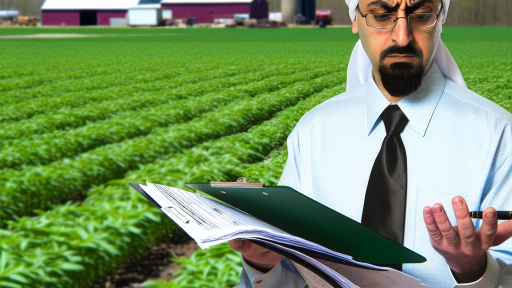Introduction to Trade Agreements and Their Importance in Agriculture
Trade agreements serve as frameworks for international trade.
These agreements define the rules and regulations governing trade relationships.
They play a vital role in supporting agricultural markets globally.
By reducing trade barriers, they encourage cross-border agricultural exchanges.
This fosters growth and innovation within the agriculture sector.
Boosting Export Opportunities
Trade agreements expand market access for agricultural producers.
Farmers can reach new consumers around the world.
This diversification helps stabilize income and reduce risk.
Moreover, it opens doors for specialty crops and value-added products.
Enhancing Competitiveness
Agreements promote competitiveness among farmers.
They encourage farmers to adopt higher quality standards and practices.
In turn, enhanced quality leads to better prices and market share.
Trade agreements also foster innovation through collaboration.
Facilitating Knowledge Transfer
Through trade agreements, farmers can learn best practices globally.
They gain access to advanced agricultural technologies and techniques.
Transform Your Agribusiness
Unlock your farm's potential with expert advice tailored to your needs. Get actionable steps that drive real results.
Get StartedThis knowledge transfer can lead to increased productivity.
Additionally, farmers can adapt to changing market demands efficiently.
Supporting Sustainable Practices
Trade agreements can incentivize sustainable agricultural practices.
They often include provisions for environmental safeguards.
Farmers can benefit from practices that improve soil health and biodiversity.
Consequently, this aligns with global sustainability goals.
Types of Trade Agreements Affecting Farming
Bilateral Trade Agreements
Bilateral trade agreements involve two countries working together on trade issues.
These agreements encourage mutual trade benefits between the partner countries.
For instance, the U.S. and Canada have such an agreement to support agricultural exports.
Through these agreements, farmers can access new markets and increase their sales.
Furthermore, these deals can lead to lower tariffs on agricultural products.
Multilateral Trade Agreements
Multilateral trade agreements include three or more countries in trade negotiations.
These agreements are typically more complex than bilateral ones.
The World Trade Organization facilitates many of these agreements.
For example, the North American Free Trade Agreement includes the U.S., Canada, and Mexico.
Such agreements aim to reduce trade barriers and enhance agricultural trade.
As a result, they can significantly impact farmers’ operations and market access.
Regional Trade Agreements
Regional trade agreements involve countries in a specific geographic area.
These agreements often aim to strengthen economic ties within the region.
The European Union’s Common Agricultural Policy exemplifies this type of agreement.
Farmers benefit from consistent regulatory standards and funding under these policies.
Additionally, regional agreements often facilitate better cross-border trade for agricultural goods.
Impacts of Trade Agreements on Farmers
Trade agreements greatly influence farming success in various ways.
They can lead to increased competition, which sometimes reduces prices.
Showcase Your Farming Business
Publish your professional farming services profile on our blog for a one-time fee of $200 and reach a dedicated audience of farmers and agribusiness owners.
Publish Your ProfileOn the other hand, agreements can open up new markets for farmers.
Access to international markets often boosts income potential.
Moreover, they can simplify export processes, making it easier for farmers.
Trade agreements play a crucial role in shaping the agricultural landscape.
The Impact of Trade Agreements on Crop Pricing and Farmer Profits
Understanding Trade Agreements
Trade agreements significantly shape agricultural markets.
They establish the rules for international trade.
Farmers benefit from favorable conditions set by these agreements.
Additionally, these agreements can reduce tariffs on agricultural products.
This reduction often leads to lower costs and increased competitiveness.
Market Accessibility
Trade agreements improve market access for farmers.
They enable farmers to export their products more easily.
This access boosts sales and profits significantly.
Furthermore, expanded markets often lead to price stabilization.
Farmers can thus better predict their revenue streams.
Crop Pricing Dynamics
Agreements affect crop pricing directly and indirectly.
They can lead to increased prices for certain crops.
For example, agreements with countries that import large volumes drive up demand.
This demand can result in higher profit margins for farmers.
On the flip side, overproduction due to competitiveness might lower prices.
Farmer Profits and Sustainability
Higher profits enable farmers to invest in sustainable practices.
They can adopt new technologies or improve soil health.
Trade agreements thus promote both financial success and environmental sustainability.
Moreover, profit stability helps farmers manage operational risks.
This balance is crucial for long-term farming success.
Regional Impacts
The effects of trade agreements vary by region.
Some regions may exploit opportunities better than others.
For instance, crop diversity in the Midwest may create unique market advantages.
Alternatively, coastal regions may benefit more from fish and seafood exports.
Understanding local dynamics can enhance strategic farming decisions.
Uncover the Details: Overview of Agricultural Export Laws
Trade Agreements and Access to International Markets for Agricultural Products
Importance of Trade Agreements
Trade agreements play a crucial role in facilitating agricultural exports.
They reduce tariffs and eliminate trade barriers effectively.
These agreements enhance market access for farmers.
Additionally, they foster stronger international relationships.
Expanding Market Opportunities
Countries can access new markets through trade agreements.
For instance, the North American Free Trade Agreement (NAFTA) benefited U.S. farmers.
Canadian and Mexican markets became more accessible as a result.
Moreover, increased competition often leads to greater innovation.
Farms can diversify their products and strategies successfully.
Strategic Partnerships
Trade agreements open up opportunities for strategic partnerships.
Showcase Your Farming Business
Publish your professional farming services profile on our blog for a one-time fee of $200 and reach a dedicated audience of farmers and agribusiness owners.
Publish Your ProfileFarmers can collaborate with international buyers and distributors.
This collaboration enhances their market reach significantly.
Furthermore, partnerships can provide valuable resources and knowledge.
Examples include joint ventures and technology exchanges.
Impact on Pricing and Profitability
Access to international markets affects pricing positively.
Farmers can sell their products at competitive prices globally.
Higher demand in foreign markets often leads to increased profits.
Consequently, farms can invest in better equipment and practices.
This investment fosters long-term sustainability and growth.
Challenges Associated with Trade Agreements
Despite the benefits, trade agreements pose certain challenges.
Market fluctuations can create uncertainty for farmers.
Additionally, foreign competition may pressure local prices.
Farmers must adapt to changing regulations consistently.
Education and support are vital for navigating these complexities.
Find Out More: Benefits of Trade Policies for Farmers
How Trade Agreements Foster Agricultural Innovation and Technology Transfer
Boosting Research and Development
Trade agreements create incentives for agricultural research and development.
They encourage collaboration between countries on innovative farming techniques.
For instance, partnerships can arise between U.S. and European agricultural researchers.
Such alliances often lead to groundbreaking technologies that improve crop yields.
Additionally, sharing knowledge across borders enhances the overall quality of agricultural practices.
Facilitating Access to New Markets
Trade agreements open access to new markets for agricultural products.
Farmers gain opportunities to export their goods to international consumers.
This expanded market access can lead to increased profits for local growers.
As a result, farmers are motivated to adopt innovative production methods.
Consequently, they invest in better technology and equipment to meet higher demand.
Encouraging Sustainable Practices
Many trade agreements include commitments to sustainable farming practices.
For example, clauses may promote environmentally friendly techniques.
These practices often rely on advanced technology and research-based solutions.
As a result, farmers may explore ways to reduce their environmental footprint.
Moreover, sustainable practices can lead to long-term benefits for the agricultural sector.
Promoting Tech Transfer and Adoption
Trade agreements facilitate the transfer of technology and best practices across borders.
Farmers gain access to cutting-edge equipment and innovative methods.
This influx of technology can dramatically increase productivity and efficiency.
Furthermore, training programs derived from these agreements help farmers adopt new technologies.
Learning from global experts enhances local agricultural capabilities.
Enhancing Competitive Advantage
Participating in trade agreements fosters a competitive edge for farmers.
Trade policies often provide financial incentives for adopting innovative practices.
Farmers that leverage these advantages can outpace competitors in global markets.
As a result, they secure better pricing and market share for their products.
Ultimately, this leads to greater resilience against market fluctuations.
Showcase Your Farming Business
Publish your professional farming services profile on our blog for a one-time fee of $200 and reach a dedicated audience of farmers and agribusiness owners.
Publish Your ProfileFind Out More: Essential Documentation For Organic Certification

Challenges Faced by Farmers in Navigating Trade Agreements
Understanding Complex Regulations
Farmers often struggle to understand complex trade regulations.
These regulations frequently vary by country and commodity.
Moreover, keeping up with changing policies adds to the confusion.
Farmers need clear and concise information to make informed decisions.
Many rely on consultants, which can be costly.
Adapting to Market Fluctuations
Market demand can shift dramatically due to trade agreements.
Farmers must remain agile to adapt to these changes.
Trade policies can impact supply chains significantly.
Consequently, farmers may experience financial instability.
They often require support to manage these risks effectively.
Building Strong Relationships
Establishing relationships with international partners is crucial.
Farmers often face challenges in finding reliable buyers abroad.
Cultural differences can complicate negotiations.
Language barriers may further hinder effective communication.
Networking opportunities can help alleviate these issues.
Accessing Financial Resources
Many farmers lack access to necessary financial resources.
Funding is often crucial for expanding operations internationally.
Trade agreements might offer financial assistance programs.
However, navigating these programs can be daunting.
Farmers may need to enlist the help of financial experts.
Ensuring Compliance with Quality Standards
Trade agreements typically impose strict quality standards.
Farmers must ensure that their products meet these requirements.
This can require significant investment in quality control processes.
Failure to comply may result in lost opportunities.
Farmers often seek certifications to enhance their marketability.
Discover More: Essential Agricultural Labor Regulations
Case Studies: Successful Farming Outcomes Attributed to Specific Trade Agreements
NAFTA and U.S. Corn Exports
NAFTA significantly boosted U.S. corn exports to Mexico.
Farmers experienced a surge in demand due to reduced tariffs.
This agreement allowed U.S. farmers to tap into a lucrative market.
In 2020, the United States exported over $2 billion worth of corn to Mexico.
This success stems from competitive pricing made possible by trade agreements.
EU’s CAP Policy and French Wine Producers
The European Union’s Common Agricultural Policy (CAP) supports French wine producers.
CAP provides subsidies that help stabilize income for farmers.
Additionally, it promotes sustainable practices within the wine industry.
These supports enhance the quality and competitiveness of French wines abroad.
As a result, France maintains its position as a leading wine exporter.
TPP and Asian Rice Producers
The Trans-Pacific Partnership (TPP) boosted export opportunities for Asian rice producers.
By lowering tariffs, TPP facilitated greater access to multiple markets.
This increased competition enhanced product quality among farmers.
Showcase Your Farming Business
Publish your professional farming services profile on our blog for a one-time fee of $200 and reach a dedicated audience of farmers and agribusiness owners.
Publish Your ProfileConsequently, farmers in countries like Vietnam saw significant income growth.
The TPP exemplifies how trade agreements impact farming success on a global scale.
Mercosur and Brazilian Beef
The Mercosur trade agreement opened doors for Brazilian beef exports.
Brazilian farmers benefited from reduced tariffs in European markets.
This trade boost resulted in increased production and export volumes.
In recent years, Brazil has become one of the world’s leading beef exporters.
Farmers attribute this to the favorable trade conditions established by Mercosur.
AFTA and ASEAN Agriculture
The ASEAN Free Trade Area (AFTA) promotes agricultural trade among member countries.
AFTA reduces tariffs and trade barriers for agricultural products.
Member countries such as Thailand and Indonesia have reported increased exports.
This heightened trade participation enhances food security across the region.
Farmers benefit from expanded market opportunities and improved profitability.
Future Trends in Trade Agreements and Their Potential Effects on Global Farming
Shifts Towards Regional Agreements
Recently, many nations have turned to regional trade agreements.
These agreements promote local agricultural products across borders.
Farmers benefit from reduced tariffs within these agreements.
This shift enhances market access for smaller producers.
Moreover, it fosters collaboration among neighboring nations.
Impact of Technology on Trade Agreements
Technology is reshaping the landscape of global trade.
Through digital platforms, farmers can connect with international markets.
Smart contracts secure transactions and enhance transparency.
Additionally, blockchain technology ensures traceability of products.
This innovation builds trust between producers and consumers.
Environmental Considerations in Trade Agreements
Increasingly, environmental sustainability is a focal point in trade discussions.
Farmers are encouraged to adopt environmentally friendly practices.
Trade agreements may incentivize sustainable farming methods.
This approach can enhance the global agricultural reputation.
Furthermore, it helps combat climate change impacts on farming.
Support for Smallholders and Developing Nations
Trade agreements often include provisions for smallholder farmers.
Support programs aim to bolster their capacity and competitiveness.
Investments in infrastructure are crucial for these communities.
Access to funding and resources improves their market standing.
Additionally, capacity-building initiatives enhance skills and knowledge.
Changing Consumer Preferences
Today’s consumers show heightened awareness of food sources.
As a result, transparency in the supply chain has become essential.
Trade agreements promoting traceability will likely gain traction.
Farmers who adapt to these trends can seize new opportunities.
This responsiveness boosts their market viability in the long run.
Additional Resources
Global Trade Liberalization and the Developing Countries — An IMF …




